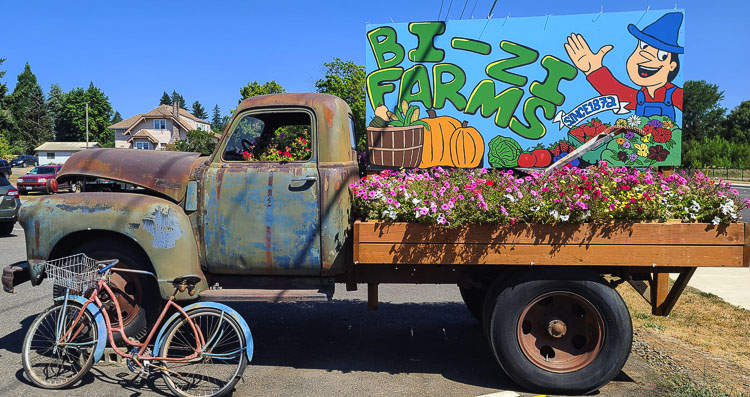The Zimmerman family has been farming in Clark County since the 19th century
This is a story that is more than 100 years old and that only started over the weekend.
A post on social media on Saturday indicated that BiZi Farms was in a bind over a water rights issue, an issue that could affect BiZi’s ability to farm in the future. The Zimmerman family has been farming in Clark County since the 19th century.
Bill Zimmerman, outside BiZi Farms’ farm shop, is concerned about the future of the shop and its farm after the state Environment Department denied water rights to the farm. The family uses a well that was built more than 100 years ago. Photo by Paul Valencia
“I think it’s great that we can be there for the community. Children can come to the pumpkin patch. Families can buy fresh local produce, ”says Bill Zimmerman, co-owner of the family business. “I am immensely happy when people come here to buy strawberries. We do our best to meet your needs. “
All of this is now threatened over a water rights issue.
The family installed a well on the property around 1900, before the Washington Water Act was passed in 1917 and well before today’s water laws were enacted. Over the years the family has improved this fountain, Zimmerman said.
Bill Zimmerman said he believes his father applied for water rights in the 1970s. Turned out it was for water certification. Bill Zimmerman said he wasn’t even sure of the difference, but when he found the farm had no water rights in 2008 or 2009, BiZi Farms filed for it.
It took 12 years, but in November 2020 the farm came forward: the Washington State Department of Ecology rejected the application.
In a letter posted on social media, BiZi Farms noted, among a list of reasons, that the DOE said water must be reserved for its “highest and best uses,” and the DOE stated that the best Uses for development and developers are intended.
“That’s old Catch-22,” Zimmerman said. “I can’t have the water. But if I sell the land and a developer comes, they can have all the water. “
Zimmerman used the words “confusing” and “confusing” when describing the judgment.
 The BiZi Farms Truck welcomes guests to the farm’s store at 9504 NE 119th Street. The Zimmerman family has farmed the land since the 1870s. Photo by Paul Valencia
The BiZi Farms Truck welcomes guests to the farm’s store at 9504 NE 119th Street. The Zimmerman family has farmed the land since the 1870s. Photo by Paul Valencia
During the Monday afternoon interview at the Vancouver farm at 9504 NE 119th Street, a family buying fresh groceries took a moment to visit the cattle.
“A family here enjoys the animals,” said Zimmerman, pointing to a mother and her children. “This is not good?”
Dozens of customers came to the farm shop throughout the interview. There have been few slow periods this summer, Zimmerman said. Since COVID, he said, more and more people are realizing where their food is coming from and placing more emphasis on locally produced food.
Zimmerman questions the DOE’s decision.
“Does the community mean nothing to you? Thousands of people look here for fresh fruit, fresh vegetables. Does that mean anything to the DOE? “
By denying water rights, Zimmerman answered his own question.
“They said, ‘We really don’t care.’ That’s tragic for me. “
Zimmerman said he understood the well needs a permit. The state required a test. Zimmermans, who worked with a groundwater consultancy, were told that the test was too costly and almost impossible to do. The Zimmermans said the water table was not affected by the farm’s well.
Calls to the Department of Ecology on Monday and Tuesday were not answered prior to the publication of this story.
In March Zimmerman said the farm had received a notice from the DOE’s enforcement department reminding the farm of the denial of water rights. BiZi Farms, Zimmerman said, is still watering its 105 acres with the well while the farm goes through the appeal process.
So what happens if the company cannot use the well or cannot find an affordable solution to find water from other sources? Zimmerman said the strawberry harvest would be cut by 40 to 50 percent. Blackberries would cut 65 percent.
“If we turn off the water … all the corn, the cucumbers, the beans, the tomatoes, all of that will go away,” he added.
In this case, decisions need to be made.
Right now the farm is preparing for the family’s 150th anniversary in Clark County. Zimmerman laughingly asserts that he has not farmed for 150 years. His family has.
However, he is seriously worried about the future.
“We’re working this out and trying to see if it’s even worth keeping the farm shop open,” said Zimmerman. “We do not know it.”
Zimmerman insists the farm doesn’t ask for free water. He knows that there are costs associated with water rights. But he believes there has to be a way for the Department of Ecology to partner with a farm with nearly 150 years of history.
He hopes the community will also support him. He said he would appreciate if his clients could reach out to the DOE and ask the agency to come up with a workable solution. The farm posted a link to a Google doc with their position on the dispute and ways to help: https://docs.google.com/document/d/16g__runYnlNydfeAej6Bknchh2aJTGPOmgnOWhwTTpE/edit


